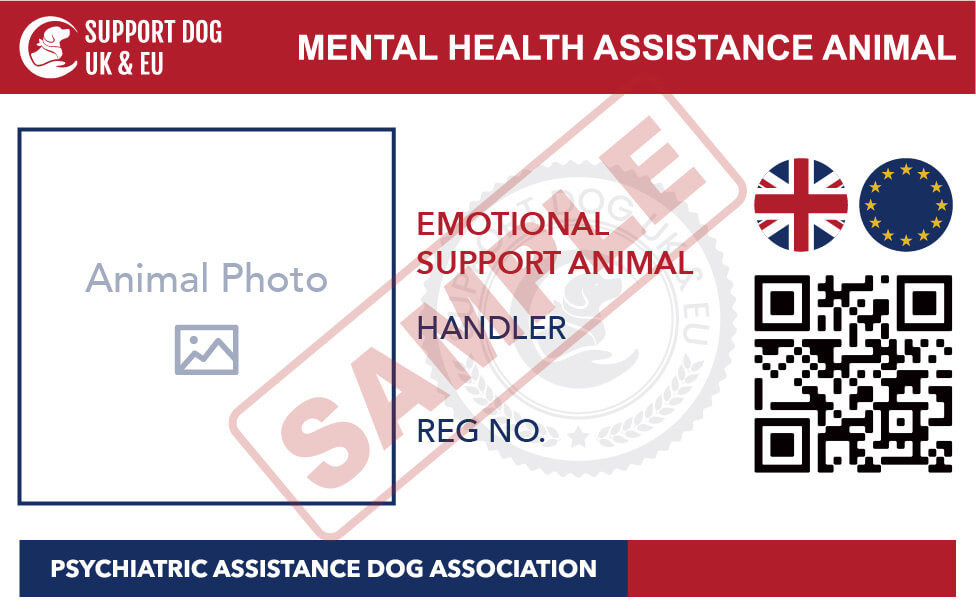An emotional support animal (ESA) is a companion animal that provides comfort and support to its owner who suffers from a mental or emotional disability. In the UK, emotional support animals are not legally recognized as service animals, but they may still be allowed in certain places and situations under the Equality Act 2010. This blog post will discuss how to register an emotional support animal in the UK, including eligibility, types of animals, rights and responsibilities of owners, the registration process, and training and certification options.
Eligibility for an Emotional Support Animal in UK
To be eligible for an emotional support animal, an individual must have a mental or emotional disability that substantially interferes with their daily life. The disability must be certified by a qualified medical professional, such as a therapist, psychologist, or psychiatrist. The medical professional must provide a letter of prescription that outlines the need for an emotional support animal and how it will improve the owner's mental health.
Types of Emotional Support Animals
In the UK, there are no specific types of animals that are designated as emotional support animals (ESAs). Unlike service animals, which are trained to perform specific tasks for their handlers with disabilities, ESAs are not required to have any specific training. This means that any animal that provides comfort and support to its owner can potentially be registered as an ESA.
Some common types of animals that people register as ESAs include dogs, cats, rabbits, birds, and even miniature horses. However, the type of animal you choose should be based on your personal preferences and needs, as well as the practical considerations of keeping the animal in your home and taking care of it.
It's important to note that some landlords or airlines may have restrictions on the types of animals that are allowed as ESAs, so it's a good idea to check with them before registering your animal. Additionally, some animals may not be suitable as ESAs due to their temperament or behaviour, so it's important to carefully consider your choice before committing to registering an animal as an ESA.
Rights and Responsibilities of Emotional Support Animal Owners
While registering an emotional support animal in the UK can provide certain benefits, it also comes with a set of responsibilities that owners must be aware of. Here are some important rights and responsibilities of emotional support animal owners:
1. Housing
Emotional support animals are not considered pets under UK law, which means that landlords and housing providers must make reasonable accommodations to allow them to live with their owners. This includes allowing ESAs in properties that have "no pets" policies. However, landlords may require documentation from a qualified healthcare professional in order to make these accommodations.
2. Travel
Under UK law, ESAs are not granted the same rights as service animals when it comes to air travel. While some airlines may allow ESAs on board, they are not required to do so. It's important to check with your airline ahead of time to ensure that your ESA is allowed on the flight.
3. Public Places
ESAs do not have public access rights, which means that they are not allowed in public places that do not allow pets, such as restaurants or shops. However, some businesses may choose to allow ESAs on their premises, so it's always best to check with the individual establishment before bringing your animal inside.
4. Responsibility
Emotional support animal owners are responsible for the behaviour of their animals. This includes ensuring that they are properly trained, well-behaved, and do not pose a risk to others. Owners are also responsible for ensuring that their animals are well-cared for and have their basic needs met.
5. Documentation
While there is no official registry for emotional support animals in the UK, some landlords or airlines may require documentation from a qualified healthcare professional to confirm that an ESA is necessary for the owner's mental health. It's important to obtain this documentation from a qualified professional in order to ensure that your rights as an ESA owner are protected. By understanding the rights and responsibilities of emotional support animal owners, you can ensure that you and your animal companion can live together in harmony while receiving the support you need.
How to Register an Emotional Support Animal
While there is no official registration process for emotional support animals in the UK, owners can take certain steps to make their animal more recognized and accepted. First, owners should obtain a letter of prescription from a qualified medical professional that outlines the need for an emotional support animal. They should then inform their housing provider or airline of their need for an emotional support animal and provide the letter of prescription. Owners may also consider getting their animal certified by a reputable organization, although this is not required by law.

Emotional Support Animal Training and Certification
Emotional support animals do not require specialized training like service animals do, but it is still important for them to be well-behaved and obedient in public settings. Owners should ensure that their animal is house-trained, does not jump or bark excessively, and is comfortable around people and other animals. While certification is not required by law, it can provide additional recognition and credibility to an emotional support animal. Owners may consider getting their animal trained by a reputable organization, such as Service Dog Training School International.
Conclusion
Registering an emotional support animal in the UK involves obtaining a letter of prescription from a qualified medical professional, informing housing providers or airlines of the need for an emotional support animal, and considering certification options. While emotional support animals do not have the same legal rights as service animals, owners are entitled to reasonable accommodations under the Equality Act 2010. Proper training and responsible ownership are important to ensure that emotional support animals provide the intended benefits without causing any harm or inconvenience to others.












